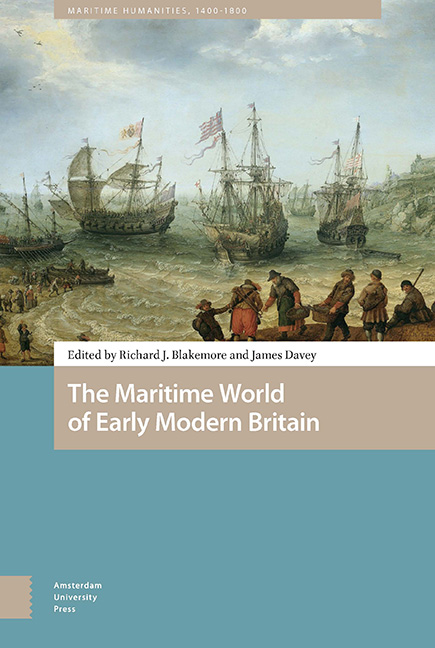Book contents
- Frontmatter
- Contents
- List of illustartions
- Acknowledgements
- Note on Conventions and Terminology
- Introduction
- 1 The Minion and Its Travels: Sailing to Guinea in the Sixteenth Century
- 2 Commanding the World Itself : Sir Walter Ralegh, La Popelinière, and the Huguenot Influence on Early English Sea Power
- 3 An Investigation of the Size and Geographical Distribution of the English, Welsh, and Channel Islands Merchant Fleet: A Case Study of 1571–72
- 4 An Evaluation of Scottish Trade with Iberia during the Anglo-Spanish War, 1585-1604
- 5 Performing ‘Water’ Ralegh : The Cultural Politics of Sea Captains in Late Elizabethan and Jacobean Drama
- 6 ‘Wicked Actions Merit Fearful Judgments’ : Capital Trials aboard the Early East India Company Voyages
- 7 A water bawdy house’: Women and the Navy in the British Civil Wars
- 8 ‘Thy sceptre to a trident change / And straight , unruly seas thou canst command’: Contemporary Representations of King Charles I and the Ship Money Fleets within the Cultural Imagination of Caroline England
- 9 ‘Proud Symbols of the Prospering Rural Seamen’ : Scottish Church Ship Models and the Shipmaster’s Societies of North East Scotland in the Late 17th Century
- 10 Systematizing the Sea : Knowledge, Power and Maritime Sovereignty in Late Seventeenth-Century Science
- Select Bibliography
- About the Contributors
- Index
Introduction
Published online by Cambridge University Press: 21 November 2020
- Frontmatter
- Contents
- List of illustartions
- Acknowledgements
- Note on Conventions and Terminology
- Introduction
- 1 The Minion and Its Travels: Sailing to Guinea in the Sixteenth Century
- 2 Commanding the World Itself : Sir Walter Ralegh, La Popelinière, and the Huguenot Influence on Early English Sea Power
- 3 An Investigation of the Size and Geographical Distribution of the English, Welsh, and Channel Islands Merchant Fleet: A Case Study of 1571–72
- 4 An Evaluation of Scottish Trade with Iberia during the Anglo-Spanish War, 1585-1604
- 5 Performing ‘Water’ Ralegh : The Cultural Politics of Sea Captains in Late Elizabethan and Jacobean Drama
- 6 ‘Wicked Actions Merit Fearful Judgments’ : Capital Trials aboard the Early East India Company Voyages
- 7 A water bawdy house’: Women and the Navy in the British Civil Wars
- 8 ‘Thy sceptre to a trident change / And straight , unruly seas thou canst command’: Contemporary Representations of King Charles I and the Ship Money Fleets within the Cultural Imagination of Caroline England
- 9 ‘Proud Symbols of the Prospering Rural Seamen’ : Scottish Church Ship Models and the Shipmaster’s Societies of North East Scotland in the Late 17th Century
- 10 Systematizing the Sea : Knowledge, Power and Maritime Sovereignty in Late Seventeenth-Century Science
- Select Bibliography
- About the Contributors
- Index
Summary
The idea of Britain as an island nation with an intrinsically maritime character and history is well-established. It is generally accepted that Britain has, and always has had, a close relationship with the sea, and that its people have always been predisposed towards travelling across the waves, drawing wealth and sustenance from them, and ruling over them. This idea also has a long heritage. One of the most famous expressions of it is in the words that William Shakespeare gave to John of Gaunt in Richard II, probably written in the 1590s:
This royall Throne of Kings, this sceptred isle,
…
This Fortresse built by Nature for her selfe
Against infection, and the hand of warre,
This happy breed of men, this little world,
This precious stone set in the silver sea,
Which serves it in the office of a wall,
Or as a Moate defensive to a house,
Against the envy of less happier Lands,
This blessed plot, this earth, this Realme, this England
Like most popular ideas, however, this one begins to break down under a closer examination. Strictly speaking Britain is not an island, but an archipelago; and nor is it one nation but several, united relatively late in their existence. Shakespeare here writes exclusively of England because at that time there was no Britain in a political sense. Furthermore, it is highly unlikely that the real John of Gaunt would have placed such faith in the sea as a ‘Moate defensive’, setting England apart in splendid isolation from ‘less happier Lands’. He operated in an essentially European political world and pursued serious designs on the Castilian throne, while a French invasion was a very real possibility throughout his rule of England during the infancy of his royal nephew.
Indeed, Shakespeare depicted the sea as a threat just as much as an asset, due both to its own hazardous and stormy nature and to the access it granted to invaders in those periods when travel by sea was generally easier and quicker than travel by land. Some hint of this can be found, perhaps, in a later passage of the same speech: ‘England, bound in with the triumphant sea, / Whose rocky shore beates backe the envious siedge / Of watery Neptune’.
- Type
- Chapter
- Information
- Maritime World of Early Modern Britain , pp. 13 - 36Publisher: Amsterdam University PressPrint publication year: 2020



